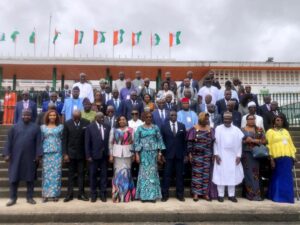By Gloria Ikibah
The Speaker of the Economic Community of West African States Parliament, Rt. Honourable Memounatou Ibrahima, has charged member states to scale up funding to meet the multifaceted challenges for the institution.
Speaker Ibrahima stated this at the delocalized meeting of the ECOWAS Parliament Joint Committee on Administration, Budget, Finance, Public Account, Macroeconomic Policy and Economic Research ongoing in Abidjan, Ivory Coast, on Monday, with the theme: ‘‘The Role of the ECOWAS Parliament in Community Budget Formulation and Monitoring’’.

She acknowledged that the subregion was currently experiencing financial difficulties and dangers, which has threatened the execution and realisation of community projects and programmess that necessitated increased funding by member states.
She stated: “I want to seize the opportunity of our meeting to call on the member states to scale up their efforts to finance the community.
“The current context is marked by the global repercussions of recession and inflation, provoked by international tensions, and the security threats within the region.
“These limited financial resources are under the important financing needs of the community.
“As you know, the community budget is supplied at 85 per cent by the community levy, which is a 0.5 per cent tax imposed on goods from countries that are not members. of the CDAO.
“Unfortunately, the last report on the state of the community presented by the President of the Commission revealed a weak mobilisation of its resources during these last years”.
According to Hon. Ibrahima, community raising is perfectly reflected in the solidarity and responsibility of its respective governments, which was aimed to build a prosperous and peaceful community environment.
The Speaker reiterated that the meeting represented not only an opportunity for collaboration but also a moment of reflection on the strategies that member states must adopt to respond to challenges in the subregion.
She further stated that the meeting is expected to address the role of the ECOWAS Parliament in the community’s budgetary process, especially against the backdrop of current challenges and realities.
“The goal is to allow the lawmakers to better understand the challenges related to the budget examination of the community in order to strengthen and consolidate the collaboration between the ECOWAS Parliament and other community institutions.
“I am convinced that our discussions on the role of ECOWAS in the elaboration and follow-up of the budget of the community will generate relevant analyses and solid recommendations to accelerate our resolution towards a community of fully integrated peoples.
“This will culminate in a peaceful and prosperous region with strong and respectful institutions of fundamental freedom working for a sustainable inclusive development.
“The index of regional integration in Africa measures to what extent the African countries in the north, the commitments they have taken in the context of various initiatives of pan-African integration, such as the African Union’s 2063 Agenda or the Abuja Treaty, relating to ECOWAS”, Ibrahima added.
The Speaker highlighted that Ivory Coast was the first high-performance ECOWAS member country based on certain dimensions of regional integration, namely: commercial integration, productive integration, and macroeconomic integration.
Speaking earlier, the Vice President of the Ivorian National Assembly, Diawara Mamadou, stated that the parliament plays an important role in the preparation of budgets both nationally and internationally.
He explained that for ECOWAS, where the Parliament plays a fundamental role in monitoring through budget preparation and oversight, it was pertinent for constituents to be informed on various actions regarding budgetary matters.
According to Mamadou, parliament is responsible for preparing and overseeing the execution of individual national budgets, so it is fundamental to understand how the community parliament examines and controls its budget.
“The general debate provides a platform for sharing experiences and developing proposals, enabling participants to enhance their capabilities and propose improvements to the existing mechanisms.
“I am therefore pleased that this relocated meeting in Abidjan addresses such an important subject as the budget,” he said.
Also speaking, Mrs Niali Kaba, Ivorian Minister of Economic Planning and Development, representing the Minister of Foreign Affairs and African Integration, Wautabouna Ouatarra, said the adoption of the ECOWAS budget marked a decisive turning point in the community’s annual life.
“While this budget outlines all the resources and expenditures planned for ECOWAS institutions for the year in a single document, it is primarily the financial translation of our region’s integration and development policy,” she said.
Chairman of the Joint Committee on Administration, Finance, Budget, Public Accounts, Macroeconomic Policy and Economic Research, Hon. Benjamin Kalu, in his remarks assured that parliament would ensure the judicious and transparently use of all funds.
Kalu who is also the Deputy Speaker of Nigerian House of Representatives, said this was only achievable through meaningful engagements with critical stakeholders like the ECOWAS Commission and the Administration and Finance Committee.
“The Parliament has a critical duty to ensure that public resources are utilised responsibly and for intended purposes by the Executives.
“As Representatives of the people of the region, we must champion the promotion and practice of transparency and accountability.
“In other words, ‘oversight’ is an indispensable parliamentary tool that should be effectively deployed to secure the accountability of the Executive to the Parliament and the citizens in general,” he said.

